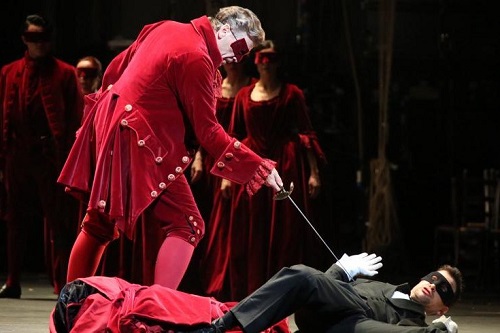Marco Brescia
By
Binoy Kampmark
Don Giovanni (some of us know him as Don Juan) was born in the fire of temptation and vitality. Tirso de Molina gave him shape in The Trickster of Seville and the Stone Guest, added more coherent limbs.
Then came the critics, with Søren Kierkegaard thinking he had the opera’s number, the sense, and the totality of Mozart’s creation which premiered in Prague in October, 1787.
In his Journals and Papers, comprising 7 volumes, Kierkegaard outlines his exhilarative torment, making his most famous stab in “The Immediate Erotic Stages or the Musical-Erotic”. His character “A” deems the opera harmonious and balanced in terms of content and form, a case of “mutual permeation”. “B” is the moralist, Judge Vilhelm, who stresses the ethical aspect.
The longer one engages this figure, the more one sees it disappear, vanish into a bundle of emotions and desires. It is the swamp of the conman, a confection of feeling that necessitates the importance of desire. “Don Giovanni, as many have noticed, is a non-person; a bundle of drives without apparent psychological motivation.” The character in Mozart’s opera insists on this theme: “Who I am you shall never know.”
The theme here, as Kierkegaard explains, is musical. (Could it be anything else?) “Mozart’s good fortune is that he has found a subject matter that is intrinsically altogether musical, and if any other composer were to compete with Mozart, there would be nothing for him to do except compose Don Giovanni all over again.”
In it is an unmistakable genius, but it has also drawn out the snark as being “a notoriously scrappy piece of dramatic construction.” Certainly, the final scene is uneven, and even unnecessary.
But complaining about operatic dramatic construction is much like lamenting the fat register of deep fried chips. The issue with Don Giovanni is aesthetic front loading and display.
Kierkegaard seems tormented by the protagonist. “In certain respects, I can say of Don Juan what Elvira says to him: ‘You murderer of my happiness – for to tell the truth it is this piece which affected me so diabolically that I can never forget it; it was this piece which drove me, like Elvira, out of the cloisters into the quiet night.”
Don Giovanni remains the well of torment to draw upon, the libertine whose moral (and amoral) engagements tease biblical morality and invite retribution. Why that should has less to do with the desert religions of monotheism as the plain attempt, by humans, to seek retribution.
His punishment, in the sense of any rake’s damnation, is cheap vengeance that seeks the superstitious formulae while regretting it. It results in delicious dramatic resolution. Sloppy dramatic casting is mended by astonishing operatic rescue. The devil, in every true sense, does have the best tunes.
The issue of love is fundamental, though it has a Christian backdrop to it, a lament about over eager eroticism and good will (all will, in fact), the sense that one’s number is up if the wick is dipped too often. Beware desire, and take heed of the moralist who sorts out the ledger.
Kierkegaard has to resort the theme of salvation and suffering, but notes that Don Juan is indulgently, and infuriatingly, aesthetic. Christ, ever a nuisance, played on the holiness of the Word, the inner truth. And how dull it was.
A man who deigns to love so much, even in rough, take-it-all fashion, to spread his wings and seed amongst the petticoats and the cunning shadow between the thighs, is doomed to a one-way ticket, all expenses paid, by the Stone Statue who seeks revenge. In the way Christ forces a personal issue of dying for sins on the Cross, the statue insists that Don Giovanni has no real choice as a consequence of his behaviour. The ghost, to use the well fashioned Kierkegaard description, “no longer speaks, he passes judgment.”
The libertine resists for as long as he can, beating off the dining advances of the Commendatore, though fiery hell yawns and pulls with inexorable force. The women (Elvira, Anna and Zerlina), animate, furnish and supply the basis of the opera, but demonstrate inconstancy. The Devil has the best tunes, but each woman here shall her tailored tune from the remorseless rake.
Figures such as Don Ottavio and Masetto have purposeful arias but little effect in hunting down the libertine, and must be left disappointed despite anger and desperation. Everything Don Giovanni touches is immeasurably transformed and is quite literally unforgettable.
This particular performance, simulcast on June 30 in the stadium of the San Francisco Giants and the San Francisco Opera, revealed how sharp and witty Don Giovanni, rendered in superb fashion by Ildebrando D’Arcangelo, can be. The jousting and play with Leporello, his servant played by Erik Anstine, is a delight. This is music as all, and fine drama to boot. As Friedrich Nietzsche observed with life tickling reality, “without music, life would be a mistake.”
Binoy Kampmark
Dr. Binoy Kampmark was a Commonwealth Scholar at Selwyn College, Cambridge. He lectures at RMIT University, Melbourne. Email: [email protected].



No Comments Yet!
You can be first to comment this post!